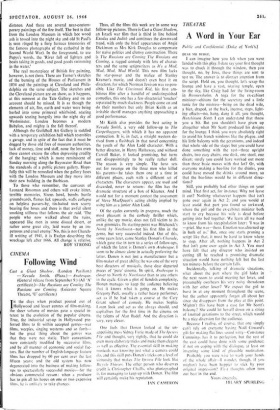CINEMA
Following Wind
Cast a Giant Shadow. (London Pavilion.) — Nevada Smith. (Plaza.) — Arabesque. (General release from September 9.) (All 'A' certificate.)—The Russians are Coining The Russians are Coming. (Leicester Square Theatre, IP certificate.)
Ithe days when product poured out of 'Hollywood and lesser centres of film-making, the sheer volume of movies gave a special in- terest to the evolution of the popular cinema. True, the industrial set-up in Hollywood pre- ferred films to fit within accepted genres—war films, weepies, singing westerns and so forth— but the great thing about the genres was that they were not static. Their conventions were constantly modified by successive films, and by all manner of economic and social fac- tors. But the number of English-language feature films has dropped by 60 per cent over the last fifteen years; and the old system has now degenerated into the business of making follow- ups to spectacularly successful movies—for the obvious commercial reason: when a producer has to pin all his hopes on one or two expensive films, he is unlikely to take chances. Thus, all the films this week are in some way follow-up pictures. There is Cast a Giant Shadow, an Israeli war film that is third in line behind Exodus and Judith and continues the downward trend, with only the brief appearances of Angie Dickinson as Mrs Kirk Douglas to compensate for naive politics and clumsy construction. There is The Russians are Coming The Russians are Coining, a ragged comedy with lots of charac- ters and the same scriptwriters as It's a Mad, Mad, Mad, Mad World. This new film lacks the star-power and the malice of Stanley Kramer's movie, and doesn't even beat it on direction, for which Norman Jewison was respon- sible. Like The Cincinnati Kid, his first am- bitious film after a handful of undistinguished comedies, this one has a few directorial `touches' separated by much slackness. People come on and do their numbers but only Brian Keith as an irritable sheriff manages anything approaching a good performance.
Mr Keith also provides the best acting in Nevada Smith, a very odd follow-up to The Carpetbaggers, with which it has no apparent connection. It is, in fact, a straight western de- rived from a flashback in that novel concerning the youth of the Alan Ladd character. With a better director, in Henry Hathaway, and without Carroll Baker, it looked promising, but turns out disappointingly to be really rather dull. The reason is very simple. The hero sets out for revenge on the three men who killed his parents—he takes them one at a time in different places, each with a different set of characters. The characters appear, are used and discarded, never to return: the film has the dramatic structure of a box of Kleenex. And I would not for a moment contest the assessment of Steve MacQueen's acting ability implied by using him as a junior Alan Ladd.
' Of the cycles currently in progress, much the most pleasant is the corhedy thriller which, unlike the spy movie, does not fall victim to its own gimmicks. Its starting-point was Hitchcock's North by Northwest—not his first film in the genre, but very successful indeed. Out of this, some years later, came Stanley Donen's Charade, which gave rise in turn to a series of follow-ups, of which the latest is Donen's own Arabesque. I seem to be almost alone in actually preferring the latter. Donen is not just a manufacturer but a film-maker of great ability: he was one of the very best directors of musicals, those dear departed pieces of 'pure' cinema. In spirit, Arabesque is closer to North by Northwest than to any others in the cycle. Given a plot of fiendish complexity, Donen manages to keep the audience believing that it knows what is going on. He makes Gregory Peck, usually a rather heavy performer, act as if he had taken a course at the Cary Grant school of comedy. He makes Sophia Loren look and act as she always should, and capitalises for the first time in the cinema on the talents of Alan Badel. And the direction is very, very clever.
One feels that Donen looked at the un- appetising mess Sidney Furie made of The Iperess File and thought, very rightly, that he could do even more elaborate tricks and make them elegant as well as effective. The essential skill in making musicals was knowing just what a camera could do, and this skill puts Doncn's tricks on a level of %irtuosity that makes The Iperess File look like Bicycle Thieves. The other person who deserves credit is Christopher Challis, who photographed it, for managing to keep up with Donen. The film will certainly make his reputation.
IAN CAMERON






























 Previous page
Previous page